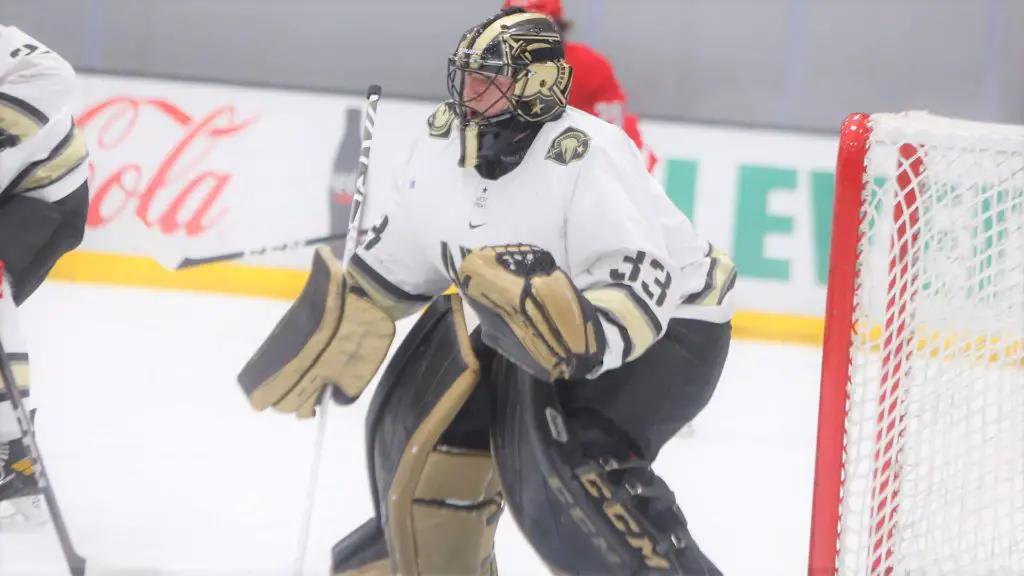
The preseason media call is always an exercise in routine.
Coaches talk about their excitement for the upcoming season and touch upon the optimism of their team’s hard work and commitment, and everyone stresses the need to get better as the season advances.
The goal, everyone says, is the same every year: to be playing “your best hockey” when the March postseason rolls around.
It sounds like coachspeak, but its foundation is an annual fact built by the league’s hottest teams. In 2019, sixth-seeded Niagara nearly upended American International after finishing the season with a 2-0-2 record. They earned two points against Canisius in their final full weekend of work before beating their ancient rival in a rematch in the first round. A trip to Air Force later, they pushed into the conference semifinals.
The year before that, Air Force lost three games after January 5 and earned a first-round bye with the No. 5 seed. By the end of March, the Atlantic Hockey champion was within a goal of defeating Minnesota-Duluth to advance to the Frozen Four.
Army West Point knows a thing or two about that list. Its 2016 iteration beat the Royal Military College in late January and lost only two games the rest of the way. It pushed a decidedly sub-.500 team closer to even and clinched the sixth seed, and the artillery didn’t stop until an overtime loss in the league semifinals.
That was five years ago, but it’s now appearing like it won’t be the Black Knights’ only act. In a year defined by stops and restarts, the Army machine is humming along with the nation’s longest unbeaten streak, the second best record in the league and a shot at challenging the nation’s notion that Atlantic Hockey is a one or two horse league.
“Every team probably has a moment where they can look back and say that’s where their season turned around, whether that’s good or bad,” Army coach Brian Riley said. “We had that weekend going into Holy Cross (in January), and even though we never (questioned) our guys’ effort, we talked about how hard we would need to compete.
“We had a great week of practice and went out there and had success, and since then, we figured out who we want to be as a team.”
The Black Knights were 3-5 at the time after splitting a weekend series with Long Island University, but half of their games played were against AIC at a time when the Yellow Jackets cannonballed wins. A month-long pause for COVID-19 factored a break into that stretch and prevented their season from getting any legs.
Those two games at the Hart Center triggered that something, though, and since then, it’s been nothing but wins. Army grabbed four straight wins against Sacred Heart while dropping only one point in a 2-2 tie that was won in a shootout. It preceded a three-game series against Bentley that included two overtime wins and a 5-1 victory on the road.
It transformed Army into one of the toughest teams in the league and a roster that digs in once it revs its engine. Opponents have scored first in 12 of their 17 games, but the Black Knights are still 7-4-1 in those games. They hold nine wins in games where they were either tied or trailing after the first period, and their plus-6 and plus-9 ratings in the second and third periods counterbalance their eight goals scored all year in the first.
There’s a dramatic panache to it, but the fact remains that the team just keeps rolling. It hasn’t allowed more than two goals in a game since its last loss, a 3-2 overtime defeat against LIU, and hasn’t allowed more than two in regulation since the 6-3 loss to AIC in early January. Six of the wins since have been in one-goal games, including the shootout win over Sacred Heart at the end of January.
“When you get into the playoffs, you’re going to be in close games,” Riley said, “and you have to feel comfortable when the games are close, whether you’re up or down by a goal. We feel that we can finish the games and be on the right side of (the result). Because they’re comfortable, they can play with competence when they’re in that situation.”
It’s led to an 8-0-1 record over the last nine games with three overtime wins and a shootout win. The points percentage that once stood at .333 is now .667, and an Army team that once looked up at the majority of the league is now in second place over both Robert Morris and Canisius.
It’s assured of a first round bye in the new divisional playoff format, but Army West Point is in the national discussion as conference tournaments are starting to gain speed. It’s 19th in both the Pairwise Rankings and RPI, and even though numbers don’t necessarily mean much to this year’s selection, a league once defined by AIC and Robert Morris is gaining a new entry into the discussion for the national tournament picture.
“Being able to get traction and play games is so important,” Riley said. “We didn’t have a good start because we played AIC four times, and that can cause issues for anybody. We practiced during the preseason and were ready, but the day before we opened up, we were shut down for a couple of weeks. The fact that we’ve been able to get traction with our schedule, the more we play, the better off that is, especially to build chemistry within the team. We’ve been very fortunate with that.
“There are good teams in Atlantic Hockey,” he reiterated. “I believe there are teams that should be considered when it’s time for the (NCAA Tournament selection procedure). As far as we’re concerned, we haven’t talked about it. That’s the best way to approach it because even though it’s cliché, when it’s all set and done, there will be a couple or a few teams considered for the tournament from Atlantic Hockey.”
Army West Point was supposed to finish its conference schedule on Tuesday, but its game against Holy Cross was postponed. The Black Knights will instead wrap their regular season with two nonconference games against LIU on Friday and Saturday.
Playoff picture, explained
The actual postseason picture lifted its fog this week when Atlantic Hockey revealed its overhaul for the postseason tournament.
In a widely-expected move, the traditional 11-team bracket was erased, and a new format introduced single elimination games for the opening weekend next week.
The league will maintain its divisional alignment through at least the first two rounds and split its playoff into western and eastern divisions. The top seeds from either side will earn byes to the quarterfinals along with the “higher seeded No. 3 team.” The lower-seeded No. 3 team will default to a first round game and absorb Air Force into its pod. More on that in a little bit.
The format should sound familiar to some Atlantic Hockey folks because it can trace its roots to the 2011 postseason. Atlantic Hockey swelled to 12 teams that year with the additions of Niagara and Robert Morris, and that first postseason experimented with a divisional alignment after the league built two, six-team, geographic pods with three intradivisional games and two interdivisional games.
The top two division leaders earned byes to the quarterfinals that year and left the remaining 10 teams to single-game first round series. The quarterfinals reseeded the advancing teams with the teams that received a bye, and the single league played a standard, best-of-three series before advancing to the semifinals and championship rounds.
The format felt like a fun idea, but it bombed horrifically. Connecticut earned a first round bye with a sixth place finish. Niagara and Robert Morris, the fourth and fifth place teams, defaulted to first round games against No. 8 Canisius and No. 7 Mercyhurst, respectively. The four eastern teams that didn’t receive byes finished in the bottom four of the league, but the format guaranteed two of them would advance while two teams with better records would be automatically eliminated.
The league quickly abandoned the format, but the disaster remained a punchline for years. More recently, the NHL reintroduced a divisional postseason in 2014, and it makes sense to limit travel in a year where there was no crossover between divisions. The pods are also much more equitable than those days.
Maybe it’ll make an appearance again in the future, but I’m still chuckling at the irony that the worst postseason format in league history is a template for a way to make this year more palatable.
Break it down
So where does that leave the league itself?
AIC clinched its third consecutive regular season championship after Robert Morris and Canisius slipped, but the concept of an overall No. 1 seed went out the window when the league realigned its postseason anyways. Instead, the Yellow Jackets enter the postseason as the top seed in the east.
The rest of their division is lining up pretty easily. Army West Point clinched the second seed in the east under the new format, and Sacred Heart clinched third in an ironic and unintended consequence of the Pioneers’ postponement from Tuesday night. Bentley, regardless of this weekend’s games against Holy Cross, clinched fourth.
That leaves Holy Cross as either the fifth or sixth place team based on what happens to Air Force. More on that in a bit.
Robert Morris, meanwhile, leads the west but could finish as low as third place. The same goes for Canisius while RIT could finish anywhere from first through fourth. Mercyhurst has the most volatility and could finish anywhere from second to fifth while only Niagara is locked into the first round. The Purple Eagles could still finish fourth, though, and could slide into sixth place if Air Force winds up in the west.
The wild card to all of this is, of course, Air Force. The Falcons will slot into either the east or west pod depending on which third place team finishes with a better percentage. If Sacred Heart doesn’t play Bentley after Tuesday’s postponement, the Pioneers can, at best, finish with a percentage of .577 with a six-point weekend against AIC. I’m essentially pinning that as the magic number because I’m pretty sure a loss clinches the Falcons to the east.
Air Force finished its regular season sandwiched between Holy Cross and Niagara and would impact the playoff matchups in either division. Right now, the Falcons are headed to Bentley for a game as the No. 5 seed in the east but could conceivably fall to sixth if Holy Cross has a big weekend. That would send them to Sacred Heart instead.
All of this assumes teams are all healthy through the end of the week and that there won’t be any postponements through the end of the season or postseason. Cancellations and reseeding could occur in those instances, but the permutations are too numerous to run through.
Also, big thanks to Chris Lerch for the math on this. I broke out my trusty abacus, but then I remembered I failed calculus in high school.


